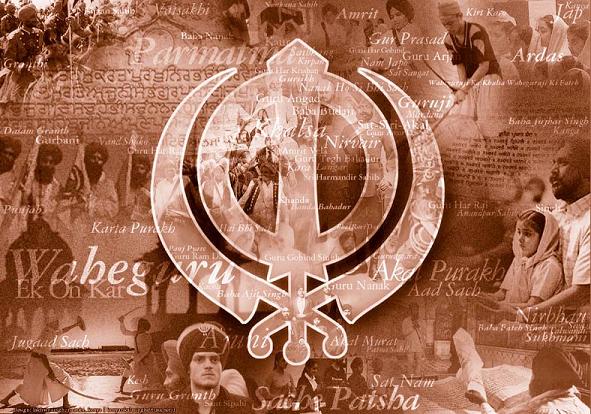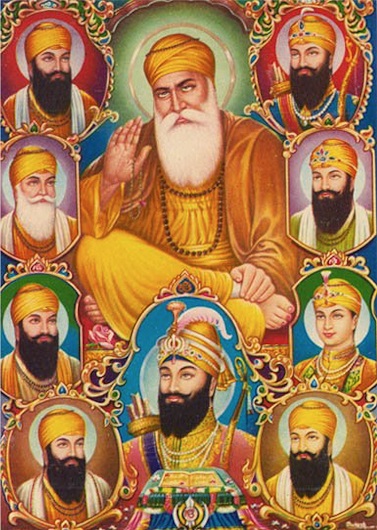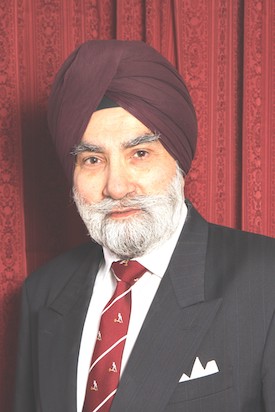The question: Is this “War on Terrorism” or an assault on religious
freedom and Civil Liberties ?
STATE v. RELIGION
- European Court of Human Rights decision banning the headscarves
- Ban on Sikh articles of faith
- Introduction of Identity Cards
- 300% Increase in “Stop and search” of Asians
- Terrorist profiling which targets practising Sikhs
- Counter-terrorism powers: Is this “Reconciling Security and Liberty
in an Open Society” ?
- Is this secularism ?
“Baabar Ke V. Baabay Ke” struggle began in the earnest when the Guru
laid down the true concept of Khalsa regime:
“The Merciful Master has now decreed that no one shall inflict
pain on another (or oppress another).
All abide in peace and this shall be the benign regime.”
(Guru Granth Sahib p.74)
Today “Baabar Ke” seems to be the “secular”
state, which is rapidly curbing religious freedoms in the West.
Secularism is state indifference to religion; that religion should be
excluded from civil affairs and public education. At its worst, as is
happening in France, it can be state interference in religious
practice. Such interference, if not challenged robustly in law courts,
becomes religious persecution when minority rights are involved.
The so called “War on Terrorism” is beginning to remove certain basic
safeguards to keep the state powers in check. This has been happening
systematically since September 11 events at the expense of civil
liberties, individual freedoms, and human and religious rights. From
the legislation already being introduced in the US it is clear that
“War on terrorism” is going to lead to further restriction of civil
liberties. Minority communities like the Sikhs are likely to suffer
most. This trend in North America and Europe is most regrettable but
not unexpected. The events in Iraq and the Middle East have provoked
Islamic reaction, while the terrorist threat to western countries
remains undiminished.
The “War on terrorism” is rapidly turning into open suppression of
human rights and freedoms by the state. In a modern civilised society,
the right to own religious identity (and cultural diversity) should be
taken for granted. However, first the “security versus religious
freedom” arguments (resulting in Kirpan ban at airports and elsewhere),
and in recent years the European ban on headscarves and Sikh turbans,
are rapidly eroding the hard won human rights over the decades through
the United Nations charters and instruments.
In a provocative decision by the European Court, which is supposed to
safeguard human rights and diversity, the European Court of Human
Rights rejected an appeal by a Turkish student, Leyla Sahin, seeking
admission to the Istanbul University medical school to wear a
headscarf. Turkey has a Muslim majority, but the state argued that
headscarves were against the state’s secularism! The Court ruled that
such a ban does not violate religious freedom and that it was the right
way to counter Islamic fundamentalism.
It seems the European Court of Human Rights has now joined the state in
suppressing the basic right to own religio-cultural identity. Such
collusion between the judiciary and the state would surely reverse the
human rights progress in recent years. The court decision takes
precedence over national court rulings. The Union of French Islamic
Organisations denounced the European Courts ruling at Strasbourg as
“politicised justice” and a form of persecution which would further
encourage the "secular" states to place yet more restriction on
religious freedom.
Sikhs suffer most due to their visible identity and articles of faith.
In fact, the Sikhs are in a worse position so far as the turban is
concerned because the Sikh “dastar” is an inseparable part of Sikh
faith. A country should not suppress people’s basic rights in the name
of secularism in this way.
Other restrictive measures: In November 2003, the Home Secretary
announced that the Government had decided to introduce a national
identity cards (ID cards) scheme. This involves comprehensive
identification of individuals using the latest technology. The aim is
to set up a National Identity Register. Richard Thomas, UK Information
Commissioner, expressed doubts about the advisability of creating the
National Identity Register. Indeed, it is surprising that civil
liberties organisations have not made headlines objecting to the
scheme.
In the US, broadening the power of the Patriot Act further restricted
civil liberties of immigrants and US residents. National Security
Letters (NSL) can be issued by FBI field officers to obtain credit
reports, electronic communications transactional records and records of
financial institutions etc. The recipient of an NSL will not be allowed
to disclosure having received such letters from FBI officials. There is
no doubt that immigrants and “profiled” members (and businesses) of
minorities would suffer most due to such extended FBI powers.
Sikhs have been the frontline victims of terrorist profiling recently.
After September 11, it was the picture of a youngish Gursikh, being
arrested in the US, which was splashed all over the British press!
“Asians” (an ambiguous label) are at the receiving end of “Stop and
search” powers of the police. There has been a 300% increase in Asians
being stopped and searched by the police in the UK recently. (Another
reason why Sikhs should be separately monitored so that we have factual
evidence about the Sikhs regarding such matters and racial assaults
etc.)
Sikhs have suffered from mistaken identity since the late Nineteen-
fifties when they started arriving in England in significant numbers.
They were called “Pakis” by the “skin-heads” and the “Teddy boys”.
“Paki-bashing” was fashionable. The British media was at least partly
responsible for spreading this ignorance by showing turban-wearing
“aliens” arriving in England. Over the years, the British media –
television, radio and the press – have remained ignorant about the
Sikhs despite over 200 years of Anglo-Sikh history; nor have the Sikhs
done much to educate the public and the media. Regrettably, those Sikhs
who have succeeded in gaining influential positions have mostly
distanced themselves from the concerns of the Sikh community at
grassroots level.
Unless religious heads join together in opposing such persecution in
the name of secularism, these ill-considered bans on religious identity
and freedom, using the most trivial of excuses, can increase tensions
between the state and faith communities.
© Copyright Gurmukh Singh (U.K.)
E-mail: sewauk2005@yahoo.co.uk
Please acknowledge quotations from this article
Articles may be published subject to prior approval by the author
STATE v. RELIGION
- European Court of Human Rights decision banning the headscarves
- Ban on Sikh articles of faith
- Introduction of Identity Cards
- 300% Increase in “Stop and search” of Asians
- Terrorist profiling which targets practising Sikhs
- Counter-terrorism powers: Is this “Reconciling Security and Liberty in an Open Society” ?
- Is this secularism ?
“Baabar Ke V. Baabay Ke” struggle began in the earnest when the Guru laid down the true concept of Khalsa regime:
“The Merciful Master has now decreed that no one shall inflict pain on another (or oppress another).
All abide in peace and this shall be the benign regime.”
(Guru Granth Sahib p.74)
Today “Baabar Ke” seems to be the “secular” state, which is rapidly curbing religious freedoms in the West.
Secularism is state indifference to religion; that religion should be excluded from civil affairs and public education. At its worst, as is happening in France, it can be state interference in religious practice. Such interference, if not challenged robustly in law courts, becomes religious persecution when minority rights are involved.
The so called “War on Terrorism” is beginning to remove certain basic safeguards to keep the state powers in check. This has been happening systematically since September 11 events at the expense of civil liberties, individual freedoms, and human and religious rights. From the legislation already being introduced in the US it is clear that “War on terrorism” is going to lead to further restriction of civil liberties. Minority communities like the Sikhs are likely to suffer most. This trend in North America and Europe is most regrettable but not unexpected. The events in Iraq and the Middle East have provoked Islamic reaction, while the terrorist threat to western countries remains undiminished.
The “War on terrorism” is rapidly turning into open suppression of human rights and freedoms by the state. In a modern civilised society, the right to own religious identity (and cultural diversity) should be taken for granted. However, first the “security versus religious freedom” arguments (resulting in Kirpan ban at airports and elsewhere), and in recent years the European ban on headscarves and Sikh turbans, are rapidly eroding the hard won human rights over the decades through the United Nations charters and instruments.
In a provocative decision by the European Court, which is supposed to safeguard human rights and diversity, the European Court of Human Rights rejected an appeal by a Turkish student, Leyla Sahin, seeking admission to the Istanbul University medical school to wear a headscarf. Turkey has a Muslim majority, but the state argued that headscarves were against the state’s secularism! The Court ruled that such a ban does not violate religious freedom and that it was the right way to counter Islamic fundamentalism.
It seems the European Court of Human Rights has now joined the state in suppressing the basic right to own religio-cultural identity. Such collusion between the judiciary and the state would surely reverse the human rights progress in recent years. The court decision takes precedence over national court rulings. The Union of French Islamic Organisations denounced the European Courts ruling at Strasbourg as “politicised justice” and a form of persecution which would further encourage the "secular" states to place yet more restriction on religious freedom.
Sikhs suffer most due to their visible identity and articles of faith. In fact, the Sikhs are in a worse position so far as the turban is concerned because the Sikh “dastar” is an inseparable part of Sikh faith. A country should not suppress people’s basic rights in the name of secularism in this way.
Other restrictive measures: In November 2003, the Home Secretary announced that the Government had decided to introduce a national identity cards (ID cards) scheme. This involves comprehensive identification of individuals using the latest technology. The aim is to set up a National Identity Register. Richard Thomas, UK Information Commissioner, expressed doubts about the advisability of creating the National Identity Register. Indeed, it is surprising that civil liberties organisations have not made headlines objecting to the scheme.
In the US, broadening the power of the Patriot Act further restricted civil liberties of immigrants and US residents. National Security Letters (NSL) can be issued by FBI field officers to obtain credit reports, electronic communications transactional records and records of financial institutions etc. The recipient of an NSL will not be allowed to disclosure having received such letters from FBI officials. There is no doubt that immigrants and “profiled” members (and businesses) of minorities would suffer most due to such extended FBI powers.
Sikhs have been the frontline victims of terrorist profiling recently. After September 11, it was the picture of a youngish Gursikh, being arrested in the US, which was splashed all over the British press! “Asians” (an ambiguous label) are at the receiving end of “Stop and search” powers of the police. There has been a 300% increase in Asians being stopped and searched by the police in the UK recently. (Another reason why Sikhs should be separately monitored so that we have factual evidence about the Sikhs regarding such matters and racial assaults etc.)
Sikhs have suffered from mistaken identity since the late Nineteen- fifties when they started arriving in England in significant numbers. They were called “Pakis” by the “skin-heads” and the “Teddy boys”. “Paki-bashing” was fashionable. The British media was at least partly responsible for spreading this ignorance by showing turban-wearing “aliens” arriving in England. Over the years, the British media – television, radio and the press – have remained ignorant about the Sikhs despite over 200 years of Anglo-Sikh history; nor have the Sikhs done much to educate the public and the media. Regrettably, those Sikhs who have succeeded in gaining influential positions have mostly distanced themselves from the concerns of the Sikh community at grassroots level.
Unless religious heads join together in opposing such persecution in the name of secularism, these ill-considered bans on religious identity and freedom, using the most trivial of excuses, can increase tensions between the state and faith communities.
© Copyright Gurmukh Singh (U.K.)
E-mail: sewauk2005@yahoo.co.uk
Please acknowledge quotations from this article
Articles may be published subject to prior approval by the author


